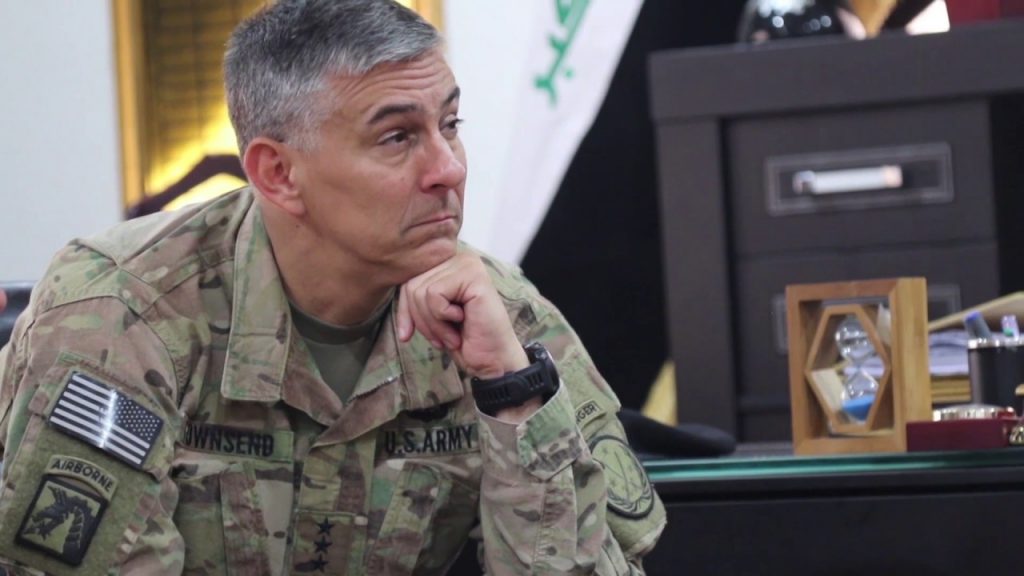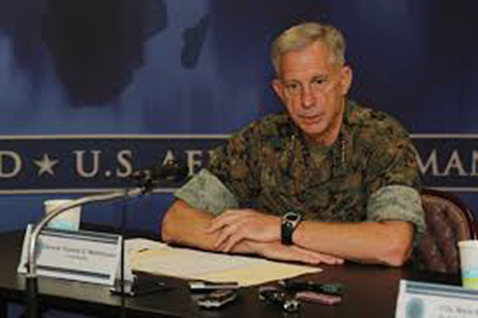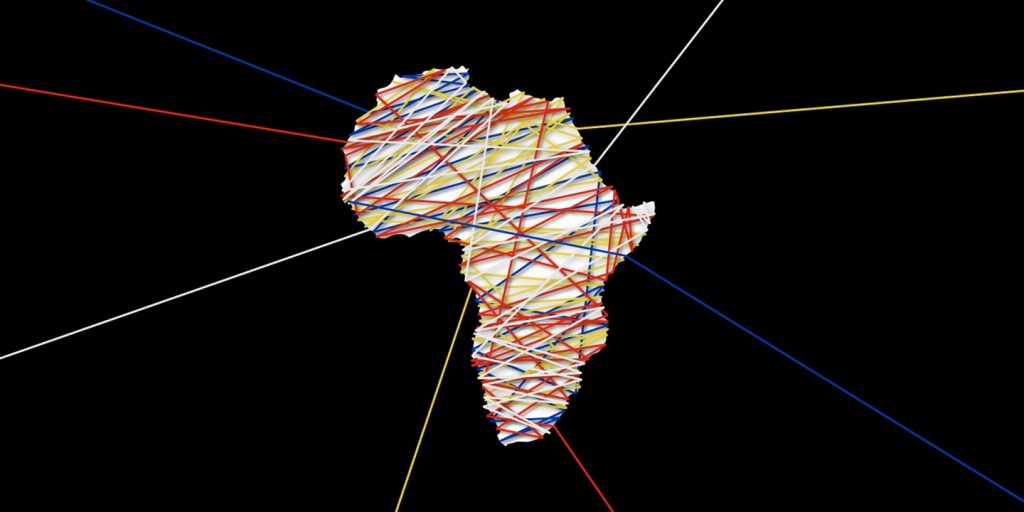
TWO GENERALS in the African detachment of the US Army, the AFRICA COMMAND (AFRICOM), Marine Corps Gen. Thomas Waldhauser and Stephen Townsend have raised alarm in their country, Russian and Chinese militaries are increasingly gaining access and influence in Africa to the “detriment” of the US, according to The Intercept, a web-based US news outlet.
Waldhauser [recently told the US Congress] current Chinese efforts in Africa were unlikely to inhibit U.S. military access and operations in the near term but warned that “China could gain that capability within the next decade.”
Townsend ranked China just below Russia as a threat to U.S. primacy in Africa but said he expected the People’s Republic of China to eclipse Russia at some point. Townsend [then] badmouthed China’s efforts [in Africa] on multiple fronts, including arms sales, and explained that the U.S. needed to emphasize the shoddy nature of Chinese military technology to African countries.
“China has provided Nigeria with armed unmanned aerial systems … but the poor quality of the platforms has contributed to infrequent use,” he wrote. “Low cost and short delivery timelines entice African partners to purchase Chinese equipment, but purchases frequently do not address the underlying military need. We need to tell this story to a greater extent,” The Intercept has quoted Townsend as saying in confidential documents obtained by the outlet.
The two generals present to the US Russian and Chinese military activities as harmful to Africa. But independent analysts disagree with that view.

While Waldhauser and Townsend painted Russian and Chinese motives as “malign” and America’s as virtuous, some experts take a different view. “It’s hard to make the case that any of the great powers truly have Africa’s best interest at heart. America’s behavior simply cannot be categorized as altruistic because its overly militarized post-9/11 foreign policy actually correlates to an increase of violence on the continent rather than deterrence.
“American officials like Nagy,” referring to the assistant secretary of state [for] African affairs, and Waldhauser seem to have the false perception that American foreign policy is loved and welcomed by Africans, but it’s really the Chinese who are winning there at the moment.
In his public testimony before the Senate in February, Waldhauser noted that the National Defense Strategy has outlined the importance of limiting “the harmful influence of non-African powers on the continent.” Temi Ibirogba, program and research associate with the Africa Program at the Center for International Policy agreed: “Waldhauser’s claim that non-African powers have a harmful influence in Africa is true — and the U.S. is one of those powers,” she said.
At the same time that U.S. military efforts in Africa have soared, as The Intercept has previously reported, key indicators of security and stability on the continent have plummeted. The Intercept’s full report published August 13, 2019 By Nick Turse follows:

The Trump administration and the Pentagon have repeatedly warned that China and Russia are expanding their influence across Africa, where the two longtime American adversaries “interfere with U.S. military operations and pose a significant threat to U.S. national security interests,” national security adviser John Bolton said last December.
That view was echoed by the former head of U.S. Africa Command, Marine Corps Gen. Thomas Waldhauser, who [has] left the job… and his replacement, Stephen Townsend, both of whom testified publicly before Congress earlier this year.
But the two generals went further in written responses to Congress obtained by The Intercept via the Freedom of Information Act, describing an Africa ever more likely to fall under the sway of Beijing and Moscow — with Russia exerting influence in as many as 10 different African countries and China likely to open more bases across the continent.
Beijing and Moscow have steadily increased their economic ties across Africa and, with them, their diplomatic sway.
Trade between China and Africa has risen from $765 million to more than $170 billion in the last 40 years, and 39 of 54 African nations have now signed on to Beijing’s Belt and Road Initiative – a trillion-dollar plan to link infrastructure and trade via a vast new network of roads, rail lines, ports, and pipelines across Eurasia, the Middle East, and Africa. Russia’s trade with Africa increased from $5.7 billion in 2009 to $17.4 billion in 2017, and the country has been aggressively promoting nuclear infrastructure and technology partnerships as well as oil and gas investments there.
Both nations have also aimed to increase their cultural influence. The number of Chinese-government-sponsored Confucius Institutes in Africa, which promote Chinese language and culture, have risen from zero in 2004 to 48 last year, according to data compiled by Development Reimagined, a Beijing-based international consulting firm.
AFRICOM documents note that these centers are located in 20 different African countries. The Russian equivalent, Russkiy Mir Foundation, a nongovernmental and nonprofit organization, is active in nine African countries, according to AFRICOM.
Russia and China have also been forging stronger military ties with African nations through arms sales, security agreements, and military training programs. Russian private military companies are active in 15 African nations, according to AFRICOM.
Last month, Beijing hosted the first China-Africa Peace and Security Forum, which brought together nearly 100 security officials from 50 African countries and the African Union, including 15 defense ministers and chiefs of general staff, according to China’s Ministry of Defense. While that gathering was underway, the Russian news agency Tass announced that roughly 35 African leaders had confirmed their attendance at the first Russia-Africa Summit – co-chaired by Russian President Vladimir Putin and Egyptian President Abdel-Fattah el-Sissi — set to be held in Russia’s Black Sea resort city of Sochi in October.
In his testimony before the Senate Armed Services Committee, Waldhauser mostly focused on Russia’s increasing inroads in Central African Republic and, to a lesser extent, Algeria, Libya, and Sudan. But in his written responses, Waldhauser mentioned six other nations that were also involved with Russia or susceptible to its influence including Angola, Guinea, Guinea-Bissau, Mali, Mauritania, and Tunisia.
Russia is leveraging or seeking to leverage military aid in return for mining rights and energy partnerships, according to Waldhauser. “To thwart Russian exploitative efforts, USAFRICOM continues to work with a host of partners to be the military partner of choice in Africa,” he wrote.
In the Central African Republic, “Russia has bolstered its influence with increased military cooperation including donations of arms, with which it has gained access to markets and mineral extraction rights,” Waldhauser explained in his public testimony. “With minimal investment, Russia leverages private military contractors, such as the Wagner Group.”
He noted that the president of the Central African Republic, Faustin-Archange Touadéra, had recently installed “a Russian civilian as his National Security Advisor. The President also promised the armed forces would be deployed nationwide to return peace to the country by forces likely trained, equipped, and in some cases, accompanied by Russian military contractors. Russia’s ability to import harsh security practices, in a region already marred by threats to security, while systematically extracting minerals, is concerning.”
Asked to privately explain these “harsh security practices,” Waldhauser mentioned reports of Russian contractor cooperation with militias and acquiescence to their human rights violations; the abuse of local security force trainees as well as civilians “who approach Russian mining interests”; and the possibility of involvement in the deaths of Russian journalists who were murdered in the Central African Republic while investigating the activities of Russian military contractors.
In his public testimony, Townsend ranked China just below Russia as a threat to U.S. primacy in Africa but said he expected the People’s Republic to eclipse Russia. “I think that they are after access and influence to our detriment,” the new AFRICOM commander said of China. Behind the scenes, Townsend also badmouthed China’s efforts on multiple fronts, including arms sales, and explained that the U.S. needed to emphasize the shoddy nature of Chinese military technology to African countries.
“China has provided Nigeria with armed unmanned aerial systems … but the poor quality of the platforms has contributed to infrequent use,” he wrote. “Low cost and short delivery timelines entice African partners to purchase Chinese equipment, but purchases frequently do not address the underlying military need. We need to tell this story to a greater extent.”
In his written remarks, Waldhauser explained that current Chinese efforts in Africa were unlikely to inhibit U.S. military access and operations in the near term but warned that “China could gain that capability within the next decade.”
While China only opened its first overseas military base, located six miles from the U.S. military’s Camp Lemonnier in the Horn-of-Africa nation of Djibouti in 2017, Waldhauser mentioned more Chinese facilities on the horizon.
“China is actively working with African partners to open new bases in several locations across the continent,” Waldhauser wrote. “By working with other [African] nations … we may be able to ensure that when China or Russia do gain military access to ports, bases, or airspace, that they are unable to take full advantage of that access to threaten U.S. freedom of maneuver in and around Africa.”
In response to perceived threats from its great power rivals, AFRICOM has launched a five-year campaign plan designed, in part, to counter the “increased presence” of China and Russia on the continent. The command is also strengthening alliances in order to “deter Chinese and Russian malign action,” Waldhauser wrote in March. In his written answers, Townsend also referenced “Russia’s malign influence in Africa” and took aim at China, noting that “[t]he Chinese have successfully promoted their false narrative that their assistance comes with no strings attached.”
While Waldhauser and Townsend painted Russian and Chinese motives as “malign” and America’s as virtuous, some experts take a different view. “It’s hard to make the case that any of the great powers truly have Africa’s best interest at heart. America’s behavior simply cannot be categorized as altruistic because its overly militarized post-9/11 foreign policy actually correlates to an increase of violence on the continent rather than deterrence,” Temi Ibirogba, a program and research associate with the Africa Program at the Center for International Policy, told The Intercept.
“American officials like Nagy,” referring to the assistant secretary of state of African affairs, “and Waldhauser seem to have the false perception that American foreign policy is loved and welcomed by Africans, but it’s really the Chinese who are winning there at the moment.”
In his public testimony before the Senate in February, Waldhauser noted that the National Defense Strategy has outlined the importance of limiting “the harmful influence of non-African powers on the continent.” Ibirogba agreed. “Waldhauser’s claim that non-African powers have a harmful influence in Africa is true — and the U.S. is one of those powers,” she said.
At the same time that U.S. military efforts in Africa have soared, as The Intercept has previously reported, key indicators of security and stability on the continent have plummeted. “Overall, militant Islamist group activity in Africa has doubled since 2012,” according to the Defense Department’s Africa Center for Strategic Studies. There are now roughly 24 “active militant Islamist groups” operating on the continent, up from just five in 2010; 13 African countries face attacks from these groups — a 160 percent increase over that same time span; and the number of “violent events” across the continent has jumped 960 percent, from 288 in 2009 to 3,050 in 2018. Source: The Intercept.



